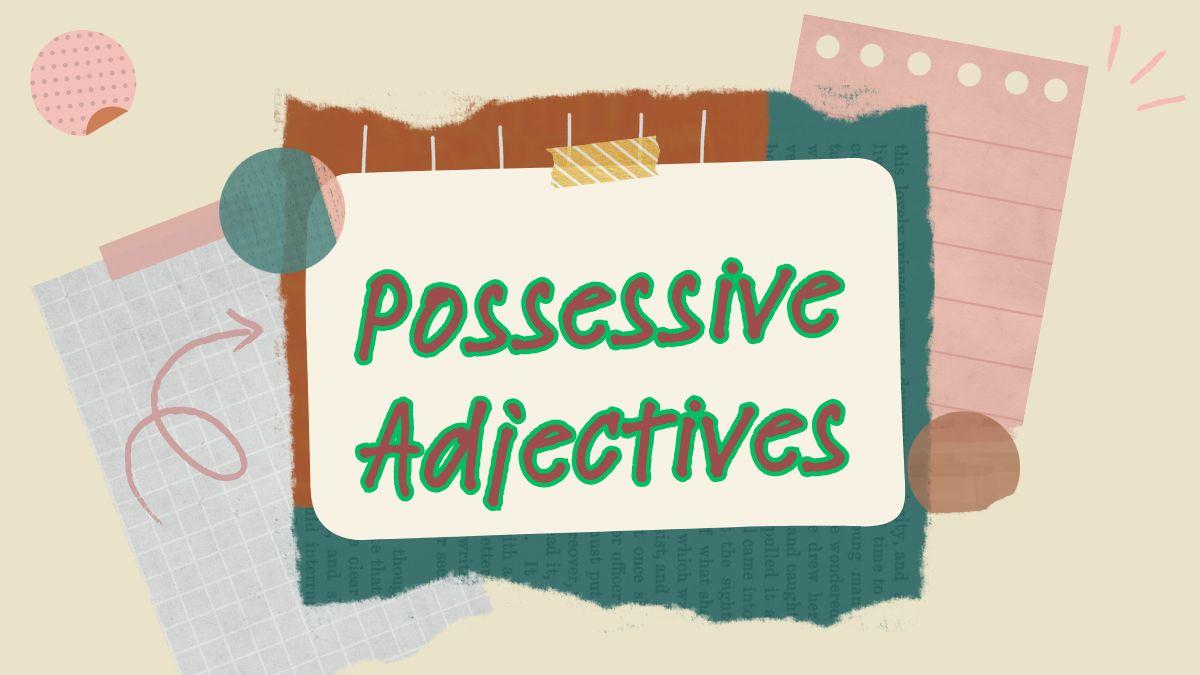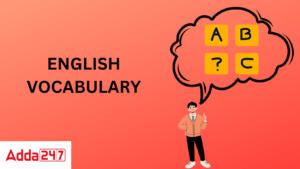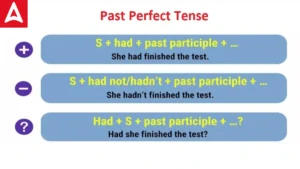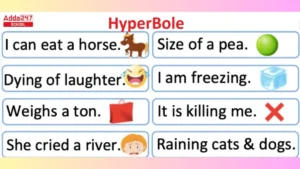As we all know, adjective are words that modifies or describes the subject (a noun or pronoun) in a sentence. The adjectives are of many types and one such type are possessive adjectives. You all must have used the possessive adjective in sentences but you would not have noticed due to inadequate knowledge. Do not worry if you do not have any knowledge of this adjective because we are providing you a detailed article on possessive adjective here.
Possessive Adjectives
You must have heard about and studied possessive nouns and possessive pronouns. A Possessive adjective is same like their counterparts in Nouns and Pronouns, i.e., are also used to show ownership or possession of a particular object.
Possessive adjectives are key components in English grammar that are essential for showing ownership or possession. They assist in explaining connections among individuals, items, and ideas by indicating who possesses or is linked to something.
Possessive Adjective Definition
A possessive adjective is any word that indicates that something belongs to or is in the possession of someone. A possessive adjective comes before a noun or a pronoun in a sentence to show who or what owns it. Check the official definition of the adjective of possessive type by famous English Dictionaries below.
According to the Merriam-Webster Dictionary, a possessive adjective is “a pronominal adjective expressing possession”.
A possessive adjective, according to the Collins Dictionary, is “an adjective such as ‘my’ or ‘your’ which shows who or what something belongs to or is connected with”.
Examples of Possessive Adjective
Mastering the use of possessive adjectives is crucial. All you have to know is that possessive adjectives describe nouns that function as the subject or object in a sentence. The provided examples below will certainly assist you.
- Mikki told me that he met your son in Chennai.
- Can you please fill my water bottle?
- This restaurant is famous for its food.
- Ram is my brother.
- My laptop is broken and has to be serviced.
- Aldrin and I went to Tambaram on his bike.
- Her father is working as a heavy vehicle mechanic in Saudi Arabia.
- Shadow is their pet dog.
- We travelled to Bangalore in my sedan car.
- Sanju borrowed my red shirt as it was the dress code for an event.
- Did you pick up your bag from the deposit counter?
Common Mistakes to Avoid While Using Possessive Adjectives
Students often make mistakes while using some commonly used possessive adjectives. Check the most common mistakes made by students below so that you can avoid them.
It’s and Its
The abbreviation “it’s” is not a possessive adjective; rather, it has nothing to do with possession. The contraction “it’s” means “it is” or “it has.” This is an absolute rule. It’s incorrect if you can’t make your “it’s” become “it is” or “it has.”
Example: A country can be judged by the quality of it’s proverbs. (wrong)
This error can be somewhat explained by the fact that apostrophes are employed to denote possession (the dog’s nose, for example). Nevertheless, “it’s” is unrelated to possession. It doesn’t, I promise.
There, They’re and Their
“They’re” is an abbreviation for “they are.” This is an absolute rule. It’s incorrect if you can’t make your “they’re” into “they are.” “There is a place, just as the term “here”. Additional expressions that employ it are “There are dragons” and “There’s an issue.”
Example: Forgive your enemies, but never forget there names. (wrong)
His and Her
English has a problem with possessive adjectives. There is not a single, non-gender-specific one that works for individuals. We have “its,” but you are not allowed to use “its” around others.
Example: Each owner is responsible for its dog. (wrong) (“Its” cannot be used with people)
You can use either “their” or “his/her.” individuals when your single person could be either male or female. We have “its,” but you are not allowed to use “its” around others.
- Each owner is responsible for his/her dog. (While this sentence is acceptable to some, but it is clumsy.)
- Each owner is responsible for their dog. (Correct) (It is appropriate to use “their” for a singular noun (in this case, “owner”). This is the greatest choice “its,” however using “its” among people is not permitted.)
A third option was to use “his” but with a disclaimer.
Example: Each owner is responsible for his dog. (wrong) (If every owner is a man, then this is acceptable. If they aren’t, steer clear of this choice, even if you do so with a disclaimer that “his” refers to “his/her”)
Who’s and Whose
The abbreviation “who’s” stands for “who is” or “who has.” This is an absolute rule. It’s incorrect if you can’t extend your “who’s” to include “who is” or “who has.”
For example: Never go to a doctor who’s office plants have died.
You’re and Your
“You are” might be shortened to “you’re.” This is an absolute rule. It’s incorrect if you can’t go beyond “you’re” to “you are.”
Example: Even if you fall on you’re face, you’re still moving forward. (wrong)
(The first “you’re” is incorrect while the second one is correct.)
Difference Between Possessive Adjective and Possessive Pronoun
Only a small number of distinctions separate a possessive adjective from a possessive pronoun. Once the distinction is recognized, all other tasks become simple. Check the difference between these two possessive types below.
| Possessive Adjective | Possessive Pronoun |
| A possessive adjective is used in a sentence to indicate ownership and offer additional details about the noun, which acts as the subject or object in the sentence. | On the contrary, a possessive pronoun is utilized to replace a noun and demonstrate possession or ownership of something or someone. |
| Examples of possessive adjective includes his, her, my, its, your and their. | Examples of possessive pronoun includes mine, yours, his, hers and theirs |
| Adjectives that are possessive might appear at the start, middle, or end of a sentence. | Possessive pronouns, unlike possessive adjectives, cannot be placed at the beginning of a sentence. |
Possessive Adjectives Exercise
As you have now learned all the important details about the possessive adjectives, solve the exercise given below to get a clear understanding.
- Sid bought a new bike. Did you see _____ new bike?
- Have you met ______ father? Don’t I look just like him?.
- We just moved into the locality recently and found that nobody likes _______ neighbor.
- Nikhil and Gowtham are getting married. _________ wedding reception begins at 5 p.m. tomorrow.
- ________ house in Delhi is a farmhouse. He goes there every summer.
- ________ English teacher asked us to complete the grammar exercises on possessive adjectives before Friday.
- I have to buy some acrylic colors to finish _____ painting.
- Kirti is leaving tomorrow. Do you know when ______ flight to London is?
- Can you bring ______ certificate file when you come?
- Did you ask her where _______ husband works?
Answers:
- Sid bought a new bike. Did you see his new bike?
- Have you met my father? Don’t I look just like him?
- We just moved into the locality recently and found that nobody likes our neighbor.
- Nikhil and Gowtham are getting married. Their wedding reception begins at 5 p.m. tomorrow.
- His house in Delhi is a farmhouse. He goes there every summer.
- Our English teacher asked us to complete the grammar exercises on possessive adjectives before Friday.
- I have to buy some acrylic colors to finish my painting.
- Kirti is leaving tomorrow. Do you know when her flight to London is?
- Can you bring my certificate file when you come?
- Did you ask her where her husband works?
| Related Articles | |
| Relative Pronouns | Common Nouns |
| Transitive and Intransitive Verbs | Conjunctive Adverbs |
| Adjectives | Compound Adjectives |











 Vocabulary Words with Meaning and Senten...
Vocabulary Words with Meaning and Senten...
 Past Perfect Tense: Definition, Formula,...
Past Perfect Tense: Definition, Formula,...
 Hyperbole- Explanation, Definition, Exam...
Hyperbole- Explanation, Definition, Exam...









